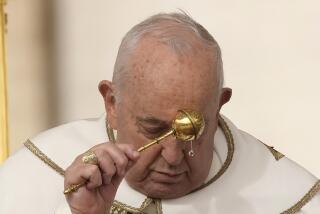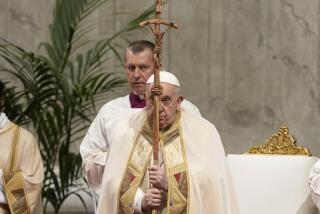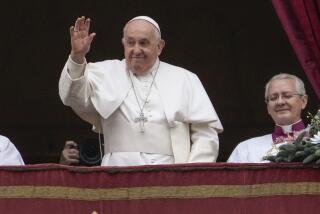Pope, Powerless to End It, Agonizes Over the War : Vatican: John Paul envisions postwar tumult in the Middle East.
VATICAN CITY — Near 1 a.m. on Jan. 17, Archbishop Angelo Sodano, the Vatican secretary of state, awakened Pope John Paul II with a fearful message: War had begun in the Persian Gulf.
“A tragedy,” the Pope said the next morning, and one that “I have done everything humanly possible to avert.”
John Paul has been losing sleep over the war ever since, he recently told a visiting friend, Polish President Lech Walesa.
Since Iraq invaded Kuwait last Aug. 2, the Pope has publicly called 40 times for a peaceful solution to the trauma of the Middle East. Vatican sources say he is anguished by a war that he believes is wrong but is powerless to halt.
Before beginning a weeklong Lenten spiritual retreat Monday, John Paul spoke anew, calling for a “just peace, peace and justice.”
“We don’t want peace at any price. We are not pacifists,” the Pope said in an apparent attempt to distance himself from Italian leftists who had been quoting him as an ally in their opposition to the war.
If war underlines the effective limits of John Paul’s moral authority--how many divisions does the Pope have?--he believes that the conflict is also an occasion for him to reaffirm it.
Before the shooting began, the Pope’s unavailing efforts to dispel clouds of war--”an adventure with no return,” as he characterized the crisis--ranged from prayer to a last-minute peace plan to appeals for restraint in emotional letters to President Bush and Saddam Hussein.
Now that the bombs are dropping, he is limited to public exhortations accompanied by a quiet search for ways to encourage dialogue as a substitute for violence.
He told Catholics to use Lent, his church’s 40-day period of fasting and penitence before Easter, to “consecrate this time to prayers for peace . . . and for those suffering because of the war and the injustices existing in the sorely troubled Middle East.”
In the political context, observers here say, the Vatican’s preoccupation is fueled by a papal apprehension that the worst may be yet to come.
“The Holy Father is concerned about the violation of international law represented by Iraq’s seizure of Kuwait. And he is deeply concerned for the humanitarian needs that occupation and war have caused for civilians on all sides in the region,” said papal spokesman Joaquin Navarro. “Significantly, he is also alarmed about the dangerous and growing gap between the West and the entire Arab world--not just Iraq. He believes it is urgent to find a way to bridge that gap.”
From the outset of the crisis, John Paul urged reliance on peaceful means to end the Iraqi occupation of Kuwait. In a peace initiative on Jan. 13, he appealed for Iraqi withdrawal and an international conference to discuss all regional problems.
As well as the return of Kuwait to Kuwaitis, the Vatican supports a Palestinian homeland, and the right of Israel to live within secure borders. It also calls for the withdrawal of all non-Lebanese forces from Lebanon, and the return of political and religious pluralism to a nation which has the largest Christian population in the Middle East.
On war’s eve, John Paul wrote to Hussein on Jan. 15, urging him to take “courageous steps (toward withdrawal), which can be the beginning of a true journey toward peace.”
To Bush, that same day, he urged dialogue, warning that “war is not likely to bring an adequate solution to international problems and that, even though an unjust situation might be momentarily met, the consequences that would possibly derive from war would be devastating and tragic.”
Beyond the papal vision of tumult in a postwar world that could see the Christian West and Islamic countries bitterly at odds, there is also a pastoral concern: The Vatican fears for the future of Christianity in the Middle East, particularly if the aftermath brings with it increased Muslim fundamentalism.
More to Read
Sign up for Essential California
The most important California stories and recommendations in your inbox every morning.
You may occasionally receive promotional content from the Los Angeles Times.









